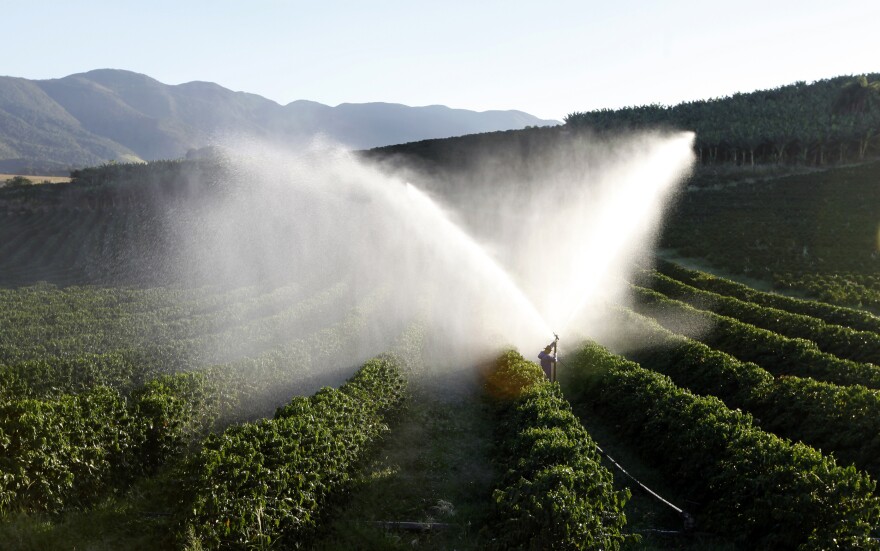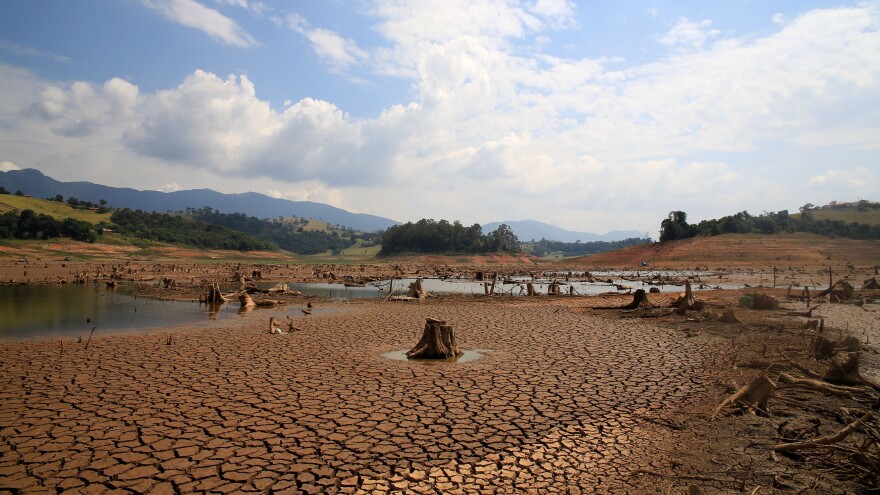Brazil, a country usually known for its rainforests, has been facing a severe drought in its breadbasket region, leaving people in the cities without water and farmers in the countryside with dying crops. Global prices for coffee, in particular, have been affected.
Scientists in Brazil say the worst is yet to come — yet no one in the government, it seems, is listening.
On a recent day, farmer Juliano Jose Polidor walks through the desiccated remains of his cornfields.
What's happened to this crop, he says, is a total loss.
And he's not alone: Drought has hit southeastern Brazil — where most of Brazil's food is produced — hard this season.
Polidor has been a farmer since he was a teenager. His father is a farmer and so are his cousins and extended family. Last year, the river in the area flooded. This year, it's completely dried up. Extreme weather, he says, shaking his head.
"All of us have never seen a drought that's been so prolonged and so aggressive as this one," Polidor says. "In 49 days, we got maybe 11 millimeters of rain."
"Every day that goes by it's getting harder," he says. "I think that will only accelerate."

What one farmer feels far into the Brazilian countryside is pretty much exactly what scientists in Brazil's cities are saying, too.
Hilton Silveira Pinto is an agro-climatologist who has worked on a number of studies for EMBRAPA, Brazil's government agency for agriculture.
"The regions where we plant coffee today, especially the ones on lower elevations, will be getting hotter," he says. "And many of the coffee plantations in these areas will probably have to be abandoned."
Pinto says that will mean that Brazil could lose some 10 percent of its coffee crop by the year 2020. Brazil is the world's biggest producer of coffee; this recent drought has already sent coffee prices surging.
Soybean and other crops are also parched.
"By 2020, we will lose 20 to 22 percent of our soybean crop. It will also affect corn, cassava, many of our Brazilian crops," Pinto says. "All of them will suffer significant losses."
All of this will happen, these scientists say, unless something changes — and quickly.

Tercio Ambrizzi is a professor at the University of Sao Paulo's Department of Atmospheric Science. He also heads Brazil's climate change council and has worked on government studies. He says what's happening requires urgent attention.
"We are going towards extremes," Ambrizzizi says. "We can have some periods with lots of rain and other periods with droughts. So we have to manage our dams in a way that we can save some more water, and we have to change ... our energy strategy in Brazil."
Currently, hydroelectric power supplies 75 percent of Brazil's energy needs. Ambrizzi says the country needs to invest in wind farms and solar energy.
As well, most of Brazil's farmers are small scale, he says, and they need access to better and heartier seeds and advice on what is happening and how to confront it.
That's where the government comes in, but not enough is being done, he says.
"We produce a lot of information ... data analysis and projections, and we don't see all this information being used by the government," Ambrizzi says. "Unfortunately in Brazil, the politics comes first."
Agro-climatologist Pinto agrees.
"The government is not giving any attention to global climate change and much less here in Brazil. They don't talk about it at all," he says. "All the presentations we do to senators and deputies, they do not have the desired effect."
For example, he says, Brazil's Ministry of Agriculture's projections for 2020 do not take into account climate change.
"We give them the studies, but they don't take heed," he says.
Pinto says that everything that's happening is unequivocally due climate change. Some have raised the issue of the effects of El Nino or La Nina, but Pinto says there is no such cyclical weather phenomenon happening now and the drought in southeastern Brazil has been severe.
But some of the people in the best position to help at-risk farmers say they don't believe what their own government scientists are telling them.

Brazilian Sen. Jose Agripino Maia is part of the so-called rural bloc in parliament.
"We don't know yet the causes of the melting of Antarctica, the long droughts in some countries, floods, tsunamis," he says.
When asked if he'd seen the studies by Brazilian government scientists that show that climate change will fundamentally alter Brazil agricultural production in the next decade, he says no.
And he admits there had been no discussion in the National Congress over the issue.
Juliano Jose Polidor, the corn farmer in the Brazilian countryside, doesn't have strong political views and doesn't know much about the debate about climate change. He says he just knows what he sees.
"I think we are getting to the hour where it's not just me who needs to be worried, but the whole world," says Polidor. "We will have to decide what to do about what is happening."
Copyright 2021 NPR. To see more, visit https://www.npr.org.



